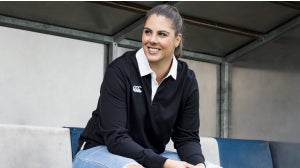
Despite women and girls’ rugby being one of the fastest growing sports, we still have some big barriers to overcome in the growing it. So, how do we work to change this?
As with anything, solutions are not always clear cut, but I wanted to have a go at exploring some possible thinking points for changing the current state of play.
Education
Accessibility to the sport is still not where it needs to be, rugby is often considered a gendered sport, especially at school age. Young girls are rarely offered the opportunity to play the game, with school curriculums favouring traditional female sports such as netball and hockey instead.
A few months ago, Girls Rugby Club launched their ‘Let the girls play’ campaign headed up by ex-England international Rachel Burford, which called for rugby to be made available to girls as part of the school curriculum, or as an extra-curricular activity.
https://www.youtube.com/watch?v=yagjGKKVCaY
School is the place where many of our rugby journeys started out, for me I was lucky enough to try rugby in a PE lesson, and after running full pelt at a tackle back I can safely say I never looked back. However, not everyone gets this as an option. Most PE teachers are either not trained to deliver full contact sessions, or don’t have access to a budget to bring in a coach that is.
Speaking of education, brands also have a big part to play in this too. As mentioned in a previous article, assumptions about women’s rugby and the athletes involved in the sport are holding back it’s progress. Brands can elevate the women’s game by dispelling commonly held myths about women who play the sport.
For example, the new marketing campaign for the Red Rose’s reframes the team as serious professionals. No longer are we seeing grainy images of players thrown together in a sub-par attempt at a marketing video, we are now giving these athletes a real chance to shine and show what they are about. Campaigns like this also serve to give non-rugby fans an appetite to get involved in the sport, which can only be a good thing.
Investment
Throwing money at a problem doesn’t always fix it, as issues run deeper than this, however investment can help to ease certain issues.
One such problem that is still rife in rugby today is that of elitism and classism. The sport long has an association with being purely for the elite, for the ‘Gentleman’ of the world, and it would be foolish to assume that this link has been completely distinguished.
Kyle Sinckler’s recent ITV documentary, Against the Odds, brought this to the surface. Throughout the episode he touches on issues of elitism within the sport, and the barriers which he faced growing up in South London.
The full-contact nature of the sport makes it more inaccessible when compared to something like football. You don’t necessarily need a coach to be present when kicking around a football, but if you want to throw a rugby ball about and put a shoulder in, a coach has to be present.
Coaches mean resources, and not every rugby club or school has access to this kind of investment. Also, rugby kit can be a big barrier to entry for some people. You need good boots to start you off, along with at least a gum shield and some form of shorts, all of these things soon add up.
Rugby is more than a sport, it is a powerful tool that allows individuals, like Kyle, to find their place in the world. With the right investment in the right places, this game will be available to everyone. How good would it be to see funding given to locations where rugby is severely underdeveloped, instead of being allocated to feed an already overbearing classist system?
Respect
Lastly, I wanted to touch on a more intangible element which is essential to growing our game – respect.
We speak a fair amount about the values attributed to rugby (teamwork, enjoyment, discipline, sportsmanship and respect) but from my perspective there is still work to be done both inside and outside of the rugby community on bringing these values into everyday life.
The sheer amount of trolling people involved in this game experience is unbelievable, I myself was on the receiving end of it and it wasn’t nice. We still have big strides to make in normalising participation in rugby for women and girls, and this starts with having respect for those in the game.
A big talking point recently is the involvement of male allies in the women’s game. Men can be extremely powerful change makers in this space. When someone with a platform as big as Ugo Moyne’s speaks out in support of the women’s game, people listen.
Tiktoker and women’s rugby advocate, Jemma (aka the Prop Life) put together a great post in the lead up to the TikTok Women’s Six Nations which can be seen below.
This article won’t have all the solutions, but I hope it goes some way to evoking behaviour which will make an impact to our sport.








